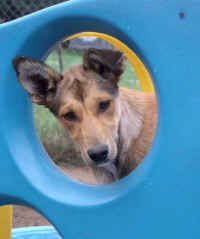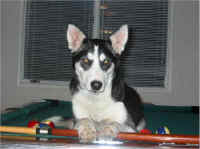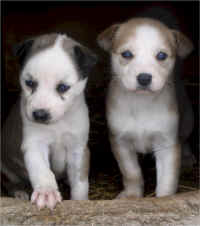Meet
Lynzie Bacchus
Jr. Iditarod Finisher 2003

[click on any
photo on this page to see a larger version]
I am 19 years old and have been racing sled dogs for 12 years now. The
first dogs I started out with were Samoyeds and Siberian Huskies. I ran my first race with
the MUSH club in Baldwin, Michigan. I started out slow with my Samoyeds and learned how to
handle them. I raced them till I was 14 then moved to Alaskan Huskies.
I got my first real lead dog from Bob and Jan Kiesling. His name was River. I then
started breeding and getting more Alaskans and now have 20 dogs that race on my teams. I
started with the MUSH
club and will occasionally run with GLSDA.
What is your primary sled dog activity or area of
interest?
My primary area of interest is a high level of recreation, which to me means that
we train very hard but do not race for money. We run with MUSH and receive plaques when we
place. The atmosphere is much more laid back and enjoyable and my dogs are not fast enough
to race pro and I do not expect that from them.
How long have you been involved with sled dogs?
I have been involved with sled dogs for 12 years now.
If you remember your very first time behind a team of dogs, tell
us about it.
I got my first ride on a dog sled when I was 8 at Mackinaw City. I rode on the 100
yard dash and from there on loved it. I got my first couple Samoyeds and soon after that
started training them. I raced my first race in Baldwin and it was something I knew that I
would be doing for a long time.
Who have been your mentors?
My biggest mentor is Jamie Nelson. If it wasn’t for all the time I spent at
her house, I would not be any where near where I am now. Thank you so much Jamie!! We run
sprint races, except I have completed the Jr. Iditarod in 2003.
What size kennel do you operate?
I have a 20 Alaskan Huskies that run and then a few others that are old and retired
so in total I have 27 dogs.
What type of tether/bowl system do you use?
All of my dogs are on 10 foot chains and have 5 gallon buckets for water. They are
fed in the morning in metal dishes and the dishes are collected daily and washed.
What are the most important considerations in housing sled dogs?
I have kennels that females and puppies go in that are indoor/outdoor kennels with
concrete floors. The most important consideration for housing sled dogs is that they are
able to stay warm when it gets cold out.
Give us an overview of your feeding program.
My dogs are fed once daily and are fed Diamond Performance Dog Food that is mixed
with water. On occasion they get cow, deer or beaver.
What breed(s) do you work with?
The breed I prefer is the Alaskan Husky. They are hard driving and easy to train.
The Alaskan Husky is willing to please.
What physical characteristics do you look for in your dogs?
I look for dogs that are well built and big. I like long legged dogs.
What mental or emotional attributes do you require in your dogs?
I want a dog that will drive all day and not give up. They must be able to recover
quickly and they must have a good head on them. I like most of my dogs to be able to want
to be up front and love it.
Tell us about an all time favorite dog or two.

My all time favorite lead dog is Wilo. I bought her from Jamie when she
was 3 months old and any one that knows me, knows Wilo.
My other favorite dogs are River and Nickolia and my first Samoyed,
Asia.
What criteria do you use for selecting breeding
stock?
When I am going to breed I want two dogs that are level headed and hard
driving. They must be proven dogs in the team and in the kennel.
Do you use any pre-training evaluation of puppies?
I don’t use any pre-training evaluation for puppies.
What method do you use for starting pups?
I harness brake all my pups at 4 months and they are put in the big team by 8
months to a year. I like to start them early because then I do not have bad habits to
break and tend to. I want a dog that will go up front and always wants to be the leader.
Most of all I like my young dogs to drive hard in harness and love what they are doing.
What is the training/racing philosophy of your
kennel?
My philosophy is that we train for the worst and anything thing else is a
piece of cake.
Do you have specific training goals for your team(s)?
I like to have at least 500 miles on my dogs by January.
What do you consider most important to accomplish in training?
I consider the most important accomplishment you can get from training is
have a team that will work together and respect each other. I like having leaders that
mind and that I have control over.
How do you choose which races to enter?
We race MUSH races--hopefully every weekend.
What are your strengths as a racer?
My strengths as a racer are that I can understand my dogs and work with
them.
What do you consider your weaknesses, if any?
My only weakness is a sense of direction. I am horrible at following the
trail!
Do you have a mushing career goal?
My goal is to have a well-rounded team at the end of the training season
so come time for winter we are all about racing. My goal for the future is hopefully to
start running the North American races starting with 6 and 8 dog class and then moving to
the Open class.
What does it take to win?
It takes heart to win and patience. If you can't put the time into your
team, you are not going to win.
 What is your vision of the future of sled dog sports? What is your vision of the future of sled dog sports?
I believe that the sport of sled dogging will grow a lot and it will
always be a sport you can enjoy.
What can individual mushers do to support and promote the sport?
The biggest thing we as musher's can do is educate the public on
responsible dog care and how sled dogs are treated.
What part do clubs and organizations play in sport development?
Always be willing to talk to them and answer questions.
What advice would you give a beginning musher?
I would tell a beginning musher to start slow. There is no need to have
the best of the best at once. How can you appreciate winning if you have never been taught
to lose? I started at the back of the pack for many years, literally getting off my sled
and running with my team. Learn as you go and never think you know it all, because that is
when you will not know anything.
Tell us about one or two of your most memorable
sled dog experiences.
I think that my most memorable experience is when I was in Alaska on the
Jr. Iditarod. That was something that I will never forget. Crossing the finish line was
such an accomplishment to me and my dogs. We may not have placed, but in our minds we were
the best. Dog sledding is something that takes time to learn and you never know everything
until you can't do it no more!
[back to Interview list]

top of page |
home |
feedback | search

|



